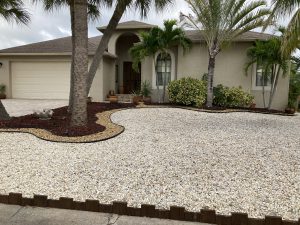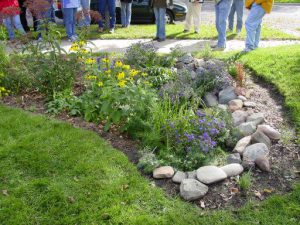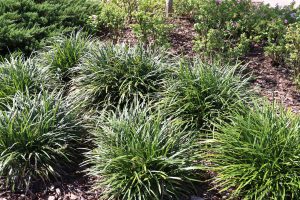A Rock Yard is Not Florida-Friendly
Rocks increase heat and can stress plants and increase plant pests and disease. They are usually imported from other states. Rocks do not support Florida’s wildlife, including bees, butterflies, birds and animals. Even with a weed barrier underneath, weeds will still grow and need to be pulled or treated with herbicide. Rocks can be used in a reasonable way around the house foundation or in rain gardens to lessen the impact of rainfall from roof overhangs.

The Florida-Friendly Landscaping™ Program does not promote a landscape of all rocks or the use of artificial turf and rubber mulch. Such materials increase heat and may result in loss of habitat, or in habitat that does not support wildlife. If an HOA review board allows any rocks, The Florida-Friendly Landscaping™ Program recommends they be used in a reasonable way in landscapes that have plants. They also can be used for accents around heat-tolerant plants and trees, in rain gardens, or to lessen the impact of rainfall from roof overhangs. A small border of rocks immediately around your house may be especially important as woody mulch along the foundation may attract insect pests, and rock will protect the soil from erosion without floating away or attracting pests.
Acceptable Uses of Rock and Stone
Rocks and stones can make great accents and are accepted for reasonable use in Florida-Friendly Landscapes. Medium-sized rocks can be arranged to create edging for landscape beds. Smaller rocks like pea gravel or crushed stone are great for lining pathways. You can set broad, flat rocks like flagstone into a bed of crushed stone and sand for a permeable pathway. You’ll end up with a Florida-Friendly patio that’s attractive and also allows water to drain. This is much better than a concrete pathway! Concrete is impermeable and does not allow rainwater to infiltrate back into the ground to recharge our groundwater supply. And finally, don’t forget to think of rocks as art. Big rocks set on their own in landscape beds make lovely sculptural accents.

Use Low Maintenance Florida-Friendly Plants to Fill your Landscape
Instead of rocks, use organic mulch such as pine bark or pine straw and living plants. Healthy lawns clean and cool the air by absorbing carbon dioxide, releasing oxygen, and collecting dust and dirt. The roots in the grass or plants will hold the soil and prevent erosion. They filter stormwater runoff, facilitate groundwater recharge, and reduce erosion, glare, and noise. There are many Florida-Friendly groundcovers and alternatives to traditional turf grass lawns. Popular options include liriope, coontie, twinflower, perennial peanut, sunshine mimosa, sand cordgrass, mthly grass and flax lily.

Want to learn more?
Check out horticulture classes offered by UF/IFAS Extension Orange County at www.ocextension.eventbrite.com. Read about Florida-Friendly Landscaping™ https://ffl.ifas.ufl.edu/. Follow us on Facebook https://www.facebook.com/GardenFlorida/, Instagram https://www.instagram.com/oc_extension/ and visit our website https://sfyl.ifas.ufl.edu/orange/home-lawns-landscapes-and-gardens/florida-friendly-landscaping/.
 7
7
